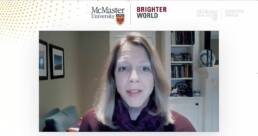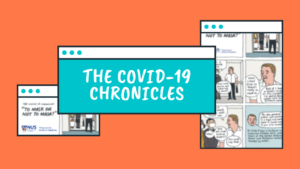University communicators have risen to the fore during the pandemic response, but face new challenges during the recovery, according to a special W100 session on reputation at the THE World Academic Summit.
Leaders in reputation at four member universities across the globe shared their experiences and thoughts about the future at the Virtual conference on 1-2 September, attended by 900 delegates from around the world.
The COVID communications response
Alan Ferns, Associate Vice President for External Relations and Reputation at the University of Manchester, identified key elements of the communications response to COVID.
“For us the key at Manchester was making sure our comms were co-ordinated, timely, easy to understand but most of all true to our core values and who we are as a brand,” he said.
At the University of Sydney the importance of focusing on different stakeholder groups and channels had been key during the pandemic.
“We had to come up with channels of comms to reach different cohorts, making sure internal and external comms were aligned,” said Tania Rhodes-Taylor, Vice Principal External Relations.
Tania also identified the challenges of managing ‘business as usual’ activity concurrently. “In addition to COVID, we had to run a university – we still had to think about supporting 70,000 students, managing and promoting our research,” she said. ”Lockdown has been the busiest we have ever been.”
Andre Farquhar, Assistant Vice President Communications and Public Affairs at McMaster University, identified authenticity as a key element driving communications during the pandemic.
“We weren’t afraid to admit that we didn’t know all the answers,” says Andrea, reflecting on how communications had to be agile to meet changing external pressures. Equally important, though, was keeping coherence in its COVID communications.
“A brand is supposed to be a promise and I’m really proud that it was very quickly determined that our brand would be a foundation for all our decision making,” said Andrea.
As premiered at #MaDAwards - a short film highlighting the impact of our research, teaching and social responsibility activities in the fight against #Covid19#UniSupport #WeAreTogether pic.twitter.com/KVzokl5NwX
— The University of Manchester (@OfficialUoM) May 7, 2020

Innovative Communications
The panelists at THE World Academic Summit W100 event shared numerous examples of innovation that communications teams had delivered during lockdown.
Ovidia Lim-Rajaram highlighted the series of comics produced at the National University of Singapore (NUS) to bring key public messages to different audiences in an accessible way.
“Universities tend to talk in the expert sphere, but one of the key things that we need to do is to engage the community from kids to parents.
“The Covid Chronicles were the brainchild of the Dean of Medicine, who apart from being a brilliant clinician is a creative guy. And they were seen across the world and translated in Italy and the Philippines.”

Source: National University of Singapore
Tania at Sydney highlighted the role played by faculty. “We had huge engagement from academic colleagues fighting the crisis; we made them available through a public programme called Sydney Ideas with upwards of 800 people joining events on the response to COVID.”
Back at NUS, Ovidia highlighted an initiative that made a huge reputational impact within the context of the recovery from the pandemic.
“We knew our students were graduating into a weak job market, so we launched an NUS resilience and Growth initiative,” said Ovidia. “The university opened up 1000 full-time salaried jobs and internships only open to the graduating cohort.”
“The way we stepped up to help the community and our graduates more than proves the value of our university at this difficult time.”
How reputation will be reimagined
Thinking ahead to the way in which reputation management will change for universities as we move into a very different environment post-lockdown, the W100 panellists identified a number of challenges.
Alan Ferns at Manchester highlighted the need to capitalise on the high profile that reputation teams have gained within their institutions during the crisis phase of the pandemic. “You need to be in the room when the decisions are taken – comms messages shouldn’t just be handed down to our teams, we need to influence the decisions, not just react to them.”
Sydney’s Tania Rhodes-Taylor reflected that, despite the real successes in delivering communications to a range of audiences, one stakeholder group in many countries that proved problematic was Government, reflected in policy decisions that did not benefit universities.
“We know that we add value to people’s lives through research, education and health outcomes, but we haven’t been bold enough at communicating these things, “said Tania.
“We need to think about making arguments in a way that an audience such as Government understands; and we need to think about how we do this collectively.”
Andrea Farquhar at McMaster, who also chairs the W100 Network, finished the session with some clear conclusion about lessons learned about reputation management during the pandemic that will stand universities in good stead as we move into the next phase.
“An unexpected Covid result has been the opportunity to explore and shake up communications and build respect for what we do within the institution and outside,” said Andrea.
“To say this has been a communications challenge is a massive understatement – it has shown that getting the job done requires a laser focus on what people actually need and that is clear messages built on principles and very clear values.”
Continuing the discussion
These challenges will be picked up at the forthcoming W100 Virtual Annual Conference, 2-6 November. Speakers and sessions already planned will look at future reputation strategies, the changing role of government relations, brand and online education, and the structures and resources needed to deliver in a changed world.
W100 members who signed up for the THE World Academic Summit, using the free code negotiated by the Network, can continue to view W100 session on the event platform throughout the month of September.
We will also be running a reputation session at the forthcoming THE Leadership and Management Summit, with free tickets again available to W100 members.

